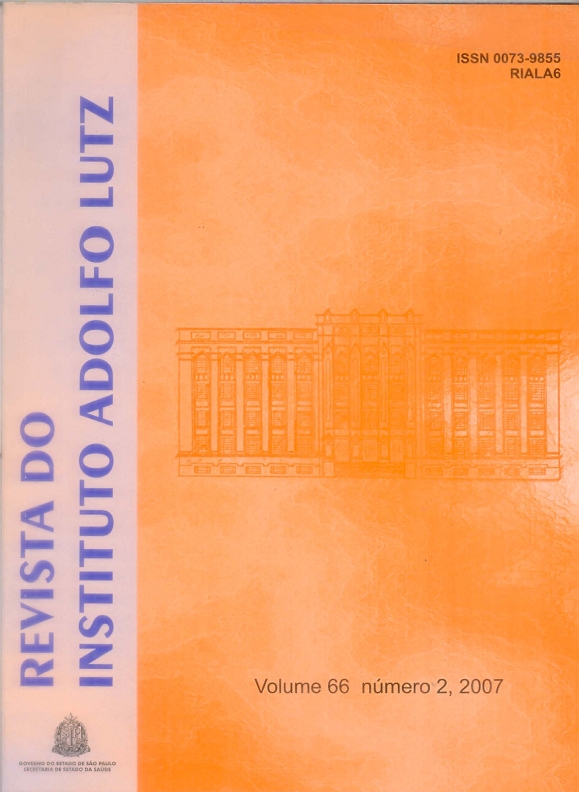Resumo
O objetivo deste trabalho foi avaliar a capacidade antioxidante do extrato etanólico de gengibre em óleo de soja, submetido ao teste de estocagem acelerada. Quatro tratamentos foram preparados e submetidos a um teste de estocagem acelerada em estufa, a 60ºC durante 12 dias: óleo de soja refinado (OSR) isento de antioxidantes sintéticos – OSR (controle), óleo de soja adicionado de 2.500mg/kg de extrato etanólico de gengibre – OSR + EG, óleo de soja adicionado de 50 mg/kg do antioxidante sintético TBHQ (tercbutilhidroquinona) – OSR + TBHQ e óleo de soja adicionado de 2.500mg/kg de extrato etanólico de gengibre mais 50 mg/kg de TBHQ – OSR + M. Amostras de cada tratamento foram recolhidas nos tempos 0, 3, 6, 9 e 12 dias de estocagem, e analisadas quanto ao índice de peróxidos e dienos conjugados. Os resultados das determinações analíticas mostraram que a capacidade antioxidante no extrato de gengibre decresce de acordo com os tratamentos utilizados e na seguinte ordem: OSR + M = OSR +TBHQ > OSR + EG > OSR.Referências
1. Turatti JM, Gomes RAR, Athié I. Lipídeos: aspectos funcionais e novas tendências. Campinas: ITAL; 2002.
2. Salinas RD. Alimentos e nutrição: introdução à bromatologia. 3th ed., Porto Alegre: Artmed, 2002; p.99-131.
3. Takeoka GR, Full GH, Dao LT. Effect of heating on the characteristics and chemical composition of selected frying oils and fats. J Am Oil Chem Soc. 1997; 45:3244-9.
4. Ordóñez JA et al. Tecnologia de alimentos: componentes dos alimentos e processos. vol I. Porto Alegre: Artmed,2005; p. 33-49.
5. Melo EA, Guerra NB. Ação antioxidante de compostos fenólicos naturalmente presentes em alimentos. BolSBCTA 2002;36:1-11.
6. Soong Y-Y, Barlow PJ. Antioxidant activity and phenoliccontent of selected fruit seeds. Food Chem.2004;88:411-417.
7. Jaswir I, Che-Man YB, Kitts DD. Use of natural antioxidants in refined palm olein during repeated deep-fat frying. Food Res Intern. 2000;33:501-8.
8. Shobana S, Naidu KA. Antioxidant activity of selected Indian spices. Prostaglandins Leukot Essent Fatty Acids2000;62:107-10.
9. Jitoe A, Masuda T, Tengah IGP, Suprapta DN, Gara IW,Nakatani N. Antioxidant activity of tropical gingerextract and analysis of the contained curcuminoids. JAgric Food Chem. 1992; 40:1337-40.
10. Zancan KC, Marques MOM, Petenate AJ, Meireles MAA. Extraction of ginger (Zingiber officinale Roscoe)oleoresin with CO2 and co-solvents: a study of the antioxidant action of the extracts. J Supercrit Fluids.2002;24:57-76.
11. Rehman ZU, Salariya AM, Habib F. Antioxidant activity of ginger extract in sunflower oil. J Sci Food Agric. 2003;83:624-9.
12. Kaur C, Kapoor HC. Anti-oxidant activity and total phenolic contend of some Asian vegetables. Intern JFood Sci Technol. 2002; 37:153-61.
13. Dutton HJ. Analysis of fats and oils. J Am Oil Chem Soc. 1978; 55:806-8.
14. Faria JAF. Antioxidantes e estabilidade de óleos comestíveis. Óleos e Grãos 1994; 20:32-4.
15. Almeida-Doria RF, Regitano-D’Arce AB. Antioxidantactivity of rosemary and oregano ethanol extracts insoybean oil under thermal oxidation. Ciênc Tecnol Aliment. 2000; 20: 197-203.
16. Kim SY, Jeong SM, Park WP, Nam KC, Ahn DU, LeeSC. Effect of heating conditions of grape seeds on theantioxidant activity of grapes seed extracts. Food Chem.2005;97:472-9.
17. AOCS. American Oil Chemists Society. Official methodsand recommended practices of the American OilChemists’ Society. Champaign; 1993.
18. Banzatto DA,; Kronka SN. Experimentação agrícola. 4nd ed. Jaboticabal: Funep, 2006.
19. Gray JI. Measurement of lipid oxidation: a review. JAm Oil Chem Soc. 1978;55:538-46.
20. Shaidi F. Natural antioxidants: an overview. In: ShaidiF. Natural antioxidants: chemistry,health, effects and applications. Champaign: AOAC, 1996; p. 1-11.
21. Gámez-Meza N, Noriega-Rodriguez JA, Medina-Juarez LA, Ortega-Garcia J, Cazarez-Casanova R,Angulo-Guerrero O. Antioxidant activity in soybean oilof extract from Thompson grape bagasse. J Am Oil Chem Soc 1999;76:1445-7.
22. Kulas E, Ackman R. Different tocopherols and the relation ship between two methods for determination of primary oxidation products in fish oil. J Am Oil ChemSoc. 2001; 49:1724-9.
23. Wheatley RA. Some trends in the analyticalchemistry of lipid peroxidation. Tr Anal Chem. 2000;19:617-28.
24. Cella RCF, Regitano-D’Arce MAB, Spoto MHF. Comportamento do óleo de soja refinado utilizado em fritura por imersão com alimentos de origem vegetal.Ciênc Tecnol Aliment. 2002;22:111-16.
25. Ruth SMV, Shaker ES, Monrrissey P.A. Influence of methanolic extracts of soybean seeds and soybean oilon lipid oxidation in linseed oil. Food Chem. 2001;75:177-84.
26. Juntachote T, Berghofer E, Siebenhandl S, Bauer F. Antioxidative effect of added dried Holy basil andits ethanolic extracts on susceptibility of cookedground pork to lipid oxidation. Food Chem. 2007;100:129-35.
27. Krings U, El-Saharty YS, El-Zeany BA, Pabel B,Berger RG. Antioxidant activity of extracts from roastedwheat germ. Food Chem. 2000;71: 91-5.
28. Iqbal S, Bhanger MI. Stabilization of sunflower oil bygarlic extract during accelerated storage. Food Chem. 2007;100:246-54.
29. Zandi P, Gordon MH. Antioxidant activity of extracts from old teas leaves. Food Chem. 1999;64:285-8.

Este trabalho está licenciado sob uma licença Creative Commons Attribution 4.0 International License.
Copyright (c) 2007 Denise Andreo, Neuza Jorge
